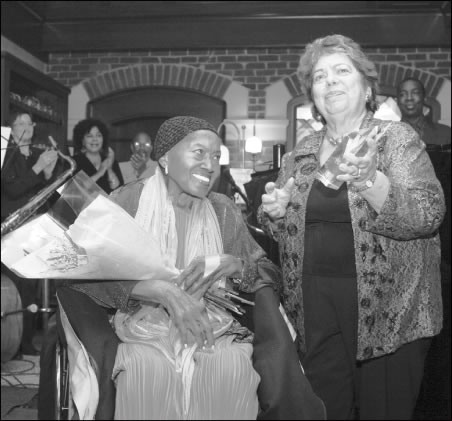By JERRY TALLMER
ght, presents Odetta with the inaugural Village Music Legends Award.
Odetta honored with the first Music Legends Award
The hot pulsing of Virginia Mayhew’s saxophone had hardly faded away when James Hart, chairperson of the Greenwich Village-Chelsea Chamber of Commerce, opened the proceedings with a little joke; actually a very serious joke.
“There are very few people,” Hart said, “who are known by one name. This week there have been two one-named people in my psyche: Obama and Odetta.”
The two-day-old president-elect of the United States was otherwise occupied in another city, but the Mother Goddess of Folk and Blues was right here in a wheelchair at the head of the first table at New York University’s Torch Club, 18 Waverly Place, this past Thursday night, where she was about to become the first honoree of a new chamber of commerce Village Music Legends Award.
Her full name, at birth — New Year’s Eve 1930, in Birmingham, Alabama — had been Odetta Holmes.
“Odetta!” the posters used to proclaim — just that — when she did her thing at Art D’Lugoff’s Village Gate and elsewhere Downtown in the ’50s, ’60s and ’70s, but that was long ago, when she was full of beans and power, a beacon to everybody from Bob Dylan to Janis Joplin to Carly Simon and back again.
Now, this evening, there had been too much buzz, too many people coming over to bend down and tell her how much she had meant to them, all their lives. Exhaustion had set in. It was hard to tell if this goddess, this ageless princess in black and tangerine glittering silks, was awake or perhaps dozing as Jim Hart turned to her and said: “Thank you for all you have done and for being here tonight.”
There lay before her on the table platters and bowls of foodstuffs she had not touched. I was fascinated by her fingers. They seemed the longest fingers in the world — long, slender, supple, brown tubes tipped with gleaming mother-of-pearl. Suddenly several of these fingers came alive, grasped a fork and speared a bit of hard-boiled egg.
Survival!
The tribute to Odetta also marks the start of a chamber of commerce series to be called Village Jazz Alive — though, as the G.V.C.C.C.’s Elizabeth Butson, publisher emeritus of this newspaper, reminded the gathering — jazz, “an ever-evolving, free and truly American form of music,” has always been crucial to Greenwich Village, and vice versa.
And Odetta, said Ms. Butson, is “a national treasure…who sang with Marian Anderson and Paul Robeson, who sang for the masses at the 1963 march to Washington, who sang at the Blue Angel and the Village Gate, who was awarded the Presidential Medal for the Arts by President Clinton… .”
Turning to the woman in the wheelchair: “You have touched so many of our hearts.”
She then read a message to Odetta from Carly Simon: the recollection by singer and disciple Simon of a moment up in Lenox, Massachusetts, in 1964, when Carly and her sister Lucy were to perform on a small stage adjacent to where the “amazing, beautiful, regal, brilliant” Odetta would be holding forth with her “enormous, dreadnought guitar.”
When the Simon sisters finished their first song to a round of applause, Carly made the mistake of looking down. There, at a table directly in front of her, sat the great Odetta herself. It was too much for young Carly Simon. She fainted. And “woke up lying on the floor” with Odetta “fanning me with a menu.”
A rather shorter message from Judy Collins sent congratulations to “the Queen of us all — socially, politically, spiritually and, of course, musically.”
Art D’Lugoff, a friend of Odetta’s for 55 years and himself a core figure in the musical history — jazz, folk, blues, what have you — of Greenwich Village, remembered the first time he had ever heard the voice of Odetta “in a Croatian church, I believe, on 42nd Street.” He started to talk about her enormous influence on everybody, only to cut himself off with a simple “Bob Dylan, for God’s sake.”
It was time for Jim Hart to hand the crystal trophy to the star of the evening. She clutched it to her lap, as Elizabeth Butson said: “Well, Odetta, you know what everyone’s been waiting for.”
But before singing, Odetta had a few words of her own. In a very low, almost inaudible voice — about her birth in Alabama, growing up in California “in the shadow of Hollywood,” struggling to tune her first guitar, and so forth.
There was one other thing. She was overjoyed, she said, almost whispered, that “we now have a black man as president of the United States.”
And she began to sing. To hum, rather, the notes slowly, almost invisibly, melting into words, sliding up and down the scale, somewhere between a wail and a hymn.
The song was “When I Lay My Burden Down.” Her friend Emory Joseph, the producer who had conveyed her to this festivity from her home Uptown, says she was singing it to herself. But everyone in that room stole a little piece of it, the way you might spear a morsel of hard-boiled egg.




































